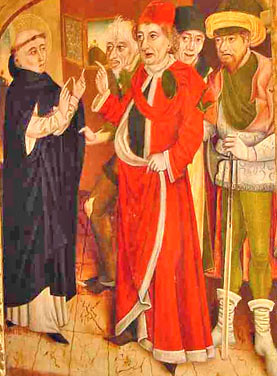The Dialogue with Unbelievers
 There has been a furore in Europe and the Islamic world recently over the publication of cartoons in the Danish and European press. This event has certainly created a lot of heat but not a lot of light has been shed on the issues facing the Church, Christian Europe and Western society in her interaction with the Islamic world and religion. St Thomas Aquinas too lived in a time of growing Muslim militancy and faced an Islamic culture that was more sophisticated and advanced than European culture. What follows is not so much a comment on the current situation and the recent uproar; too much is being said on every side and not enough reflection (although this is a good exception from an American Muslim). Neither is it (nor any of Fra' Tommaso's works) an easy answer to our contemporary questions; those who think the Summa Theologiae is simply a compendium of answers and solutions are mistaken. Rather, what follows is a brief extract from Aquinas' Summa contra Gentiles, which was begun in 1258, and it offers some warning of the complexities of inter-religious dialogue... Which is precisely why we need to stop, reflect, think carefully, pray, investigate and contemplate before embarking on any course of action.
There has been a furore in Europe and the Islamic world recently over the publication of cartoons in the Danish and European press. This event has certainly created a lot of heat but not a lot of light has been shed on the issues facing the Church, Christian Europe and Western society in her interaction with the Islamic world and religion. St Thomas Aquinas too lived in a time of growing Muslim militancy and faced an Islamic culture that was more sophisticated and advanced than European culture. What follows is not so much a comment on the current situation and the recent uproar; too much is being said on every side and not enough reflection (although this is a good exception from an American Muslim). Neither is it (nor any of Fra' Tommaso's works) an easy answer to our contemporary questions; those who think the Summa Theologiae is simply a compendium of answers and solutions are mistaken. Rather, what follows is a brief extract from Aquinas' Summa contra Gentiles, which was begun in 1258, and it offers some warning of the complexities of inter-religious dialogue... Which is precisely why we need to stop, reflect, think carefully, pray, investigate and contemplate before embarking on any course of action.
"It is difficult to argue against errors. First of all, we know too little about the troubling ideas of different opponents, so we can't begin our argument (as we should) by examining what they really feel in order to critically rejoin their false conclusions. The doctors of early times knew the doctrines of the pagans, since they had once themselves been pagans (or had at least lived among them) and were acquainted with how they thought.
Further, we can't have recourse in dialogue with the Muslims or pagans to the same authorities to support our arguments. With the Jews, we can bring the Old Testament to bear; with heretics, the New Testament. But unbelievers do not accept these books. So with unbelievers we are obliged to have recourse to pure reasoning, to which everyone can give their assent. But reason is feeble in treating of divine matters.
In dealing with reasonable truths, we can convince our opponent through rational arguments; but in treating of God's revelation, our investigations have to go beyond the toil of reasoning. We should not seek to convince others concerning revelation by reasonable arguments, but reason only to resolve objections to the faith by showing that they do not contradict the faith.
The methodology of theological discussion implies the authority of God's word confirmed by miracles, since it is exclusively upon this word that we build our faith in the supernatural truths about God. In dialogue with believers, we can certainly have recourse to arguments of convenience (persuasion) to expand and strengthen their already existing faith. But we can't do this with unbelievers; otherwise the inadequacy of our rational arguments might confirm them in their denial of the faith and lead them to imagine that our own assent in faith is based upon only the poor reasoning we come up with."
"we [Christians] should not put our trust in either forced assent under threat of weapons or in the seduction of earthly rewards. Rather, the decisive witness to the gospel is that, without any extraordinary signs, the world should be led to believe, by the example of ordinary and unsophisticated people, in a truth so difficult to believe, to hope for so noble a destiny, and to live a life so demanding. The example of wise figures from the past, their passion for truth and their committed quest for their true destiny, reassure us in our own quest. They are a symbol of our privilege to live with faith in the word of God."
Indeed, let the last word go to the Holy Father, whose example and whose first encyclical reminds us how best we can witness to unbelievers and the world of the truth of the gospel and our faith in Jesus Christ:
"At the same time, the devotion of the faithful shows an infallible intuition of how such love is possible: it becomes so as a result of the most intimate union with God, through which the soul is totally pervaded by him—a condition which enables those who have drunk from the fountain of God's love to become in their turn a fountain from which “flow rivers of living water” (Jn 7:38). Mary, Virgin and Mother, shows us what love is and whence it draws its origin and its constantly renewed power. To her we entrust the Church and her mission in the service of love..."







0 Comments:
Post a Comment
<< Home